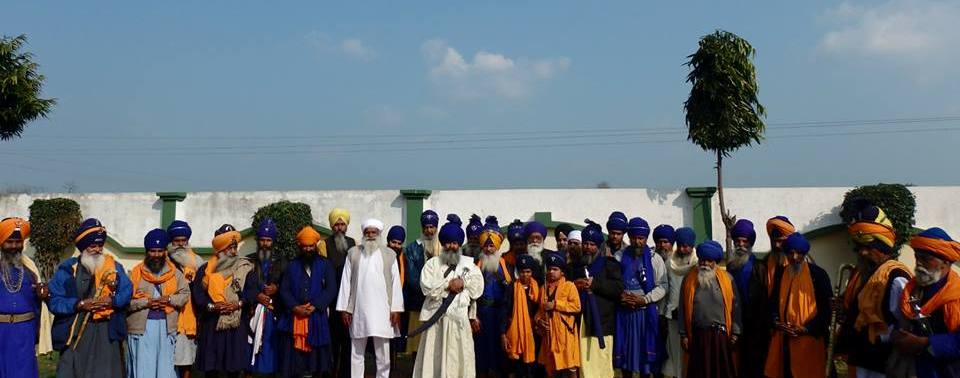Khalsa Bole on:
[Wikipedia]
[Google]
[Amazon]
Khalsa bole (Gurmukhi: ਖ਼ਾਲਸਈ ਬੋਲੇ or ਖ਼ਾਲਸਾ ਬੋਲੀ; ''Ḵẖālasa'ī bōlē'', ''Ḵẖālasā bōlī''; meaning "words of Khalsa"; alternatively transcribed as Khalsa boli) is a bravado-based language variety developed and spoken by members of the Akali-Nihang sect of Sikhism. It has also been described as a coded language. Sant Singh Sekhon describes the lect as a "grandiloquent patois" that "comprises euphemisms and jargon symbolic of high-spirited confidence and courage".
 The dialect is still used by some modern Sikhs, especially the Akali-Nihangs. Nihangs still employ Khalsa Bole in their encampments and also when they talk to members of the general public. The Khalsa Bole used by Nihangs today with the public are for the purpose of comedy but also secrecy. The euphemisms used by the Nihangs can be interpreted as derogatory.
Many modern Nihangs are ridiculed for using their dialect. They are often the target for jokes by outsiders. Many of the terms of Khalsa Bole have been forgotten and lost.
The dialect is still used by some modern Sikhs, especially the Akali-Nihangs. Nihangs still employ Khalsa Bole in their encampments and also when they talk to members of the general public. The Khalsa Bole used by Nihangs today with the public are for the purpose of comedy but also secrecy. The euphemisms used by the Nihangs can be interpreted as derogatory.
Many modern Nihangs are ridiculed for using their dialect. They are often the target for jokes by outsiders. Many of the terms of Khalsa Bole have been forgotten and lost.
Names
Other common names for the lect are ''Gar Gaj Bole'' (ਗੜਗੱਜ ਬੋਲੇ; meaning "words that thunder"), ''Nihang Singh de Bole'' ("words of the Nihang Sikhs"), ''Nihang Bola'' ("Nihang speak"), and ''Khalsa de bole'' ("words of the Khalsa").Purpose
The dialect encompasses the Sikh philosophical concept of remaining ever optimistic, known as '' Chardi kala''. The unique dialect serves martial and mental objectives, such as helping the speaker and listeners remain in high-spirits in the face of adversity. It serves as a verbal act of dissent in the face of troubling circumstances.History
Origin
Some claim it was invented by Banda Singh Bahadur, the early 18th century Sikh general and martyr. Sikh scholar, Piara Singh Padam, claims it originated earlier in the 17th century, during the time of the Sikh gurus. The dialect developed during the period of intense persecution of the Sikhs by theMughal
Mughal or Moghul may refer to:
Related to the Mughal Empire
* Mughal Empire of South Asia between the 16th and 19th centuries
* Mughal dynasty
* Mughal emperors
* Mughal people, a social group of Central and South Asia
* Mughal architecture
* Mug ...
and Durrani empires in the 18th century. During that period, Sikhs vacated for the mountains, jungles, and deserts to escape the genocidal policies enacted against them.
Jasbir Singh Sarna claims the language variety evolved during the time-period of Nawab Kapur Singh.
Accord to Sant Singh Sekhon, the Nihangs developed the special vocabulary full of euphemisms and parallels to common words and phrases to complement their martial role and character. The terms were used by Nihangs to "make light of hardships", to describe enemies in a bold and provocative manner, and to belittle/ridicule things of worldly comfort.
Present-day
 The dialect is still used by some modern Sikhs, especially the Akali-Nihangs. Nihangs still employ Khalsa Bole in their encampments and also when they talk to members of the general public. The Khalsa Bole used by Nihangs today with the public are for the purpose of comedy but also secrecy. The euphemisms used by the Nihangs can be interpreted as derogatory.
Many modern Nihangs are ridiculed for using their dialect. They are often the target for jokes by outsiders. Many of the terms of Khalsa Bole have been forgotten and lost.
The dialect is still used by some modern Sikhs, especially the Akali-Nihangs. Nihangs still employ Khalsa Bole in their encampments and also when they talk to members of the general public. The Khalsa Bole used by Nihangs today with the public are for the purpose of comedy but also secrecy. The euphemisms used by the Nihangs can be interpreted as derogatory.
Many modern Nihangs are ridiculed for using their dialect. They are often the target for jokes by outsiders. Many of the terms of Khalsa Bole have been forgotten and lost.
Linguistic sources
Khalsa bole sources its vocabulary from "a mixture ofPunjabi
Punjabi, or Panjabi, most often refers to:
* Something of, from, or related to Punjab, a region in India and Pakistan
* Punjabi language
* Punjabi people
* Punjabi dialects and languages
Punjabi may also refer to:
* Punjabi (horse), a British Th ...
, Old Hindi, Persian and other dialects used in various regions of India".
List of vocabulary examples
See also
* Chardi kala * Punjabi language * Punjabi dialects and languages *Sant Bhasha
Sant Bhasha (ਸੰਤ-ਭਾਸ਼ਾ ; ''Sant Bhāṣā'') is a language composed of vocabulary common to northern Indian languages, which was extensively used by saints and poets to compose religious verses. It can be understood by readers with ...
Further reading
* * *Notes
References